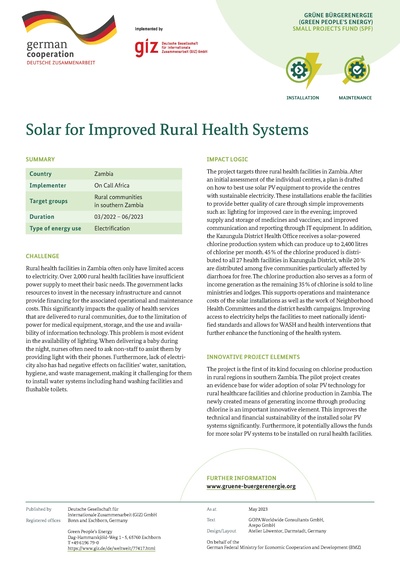Difference between revisions of "Solar for Improved Rural Health Systems"
From energypedia
***** (***** | *****) |
***** (***** | *****) |
||
| Line 1: | Line 1: | ||
{{GBE ProjectDB | {{GBE ProjectDB | ||
| − | |GBE project name=Solar for Improved | + | |GBE project name=Solar Electricity and Chlorine Production for Improved Rural Health Systems |
|GBE organisation=On Call Africa | |GBE organisation=On Call Africa | ||
|GBE date start=March 2022 | |GBE date start=March 2022 | ||
| Line 12: | Line 12: | ||
|GBE category community=Community-based Approaches | |GBE category community=Community-based Approaches | ||
|GBE category enaccess=Energy Access | |GBE category enaccess=Energy Access | ||
| + | |GBE category social=Social Institutions | ||
|GBE countrySPF=Zambia | |GBE countrySPF=Zambia | ||
|GBE locationSPF=-17.78779, 25.27602 | |GBE locationSPF=-17.78779, 25.27602 | ||
Latest revision as of 15:00, 7 May 2024
Solar Electricity and Chlorine Production for Improved Rural Health Systems
Last edit made by Helen Mengs on 2024-05-07. This is a wiki, do not hesitate to update information by clicking on "Edit with form".
Key Data
Organisation
On Call Africa
Duration
March 2022 - June 2023
Project Description
The project targets three rural health facilities in Zambia. After an initial assessment of the individual centres, a plan is drafted on how to best use solar PV equipment to provide the centres with sustainable electricity. These installations enable the facilities to provide better quality of care through simple improvements such as: lighting for improved care in the evening; improved supply and storage of medicines and vaccines; and improved communication and reporting through IT equipment. In addition, the Kazungula District Health Office receives a solar-powered chlorine production system which can produce up to 2,400 litres of chlorine per month. 45 % of the chlorine produced is distributed to all 27 health facilities in Kazungula District, while 20 % are distributed among five communities particularly affected by diarrhoea for free. The chlorine production also serves as a form of income generation as the remaining 35 % of chlorine is sold to line ministries and lodges. This supports operations and maintenance costs of the solar installations as well as the work of Neighborhood Health Committees and the district health campaigns. Improving access to electricity helps the facilities to meet nationally identified standards and allows for WASH and health interventions that further enhance the functioning of the health system.
GBE Component
Small Projects Fund
Categories
- Financing
- Community-based Approaches
- Energy Access
- Social Institutions
Factsheet
Location
Country SPF
Zambia
Geographic coordinates of project site
17° 47' 16.04" S, 25° 16' 33.67" E
Latitude Longitude




















